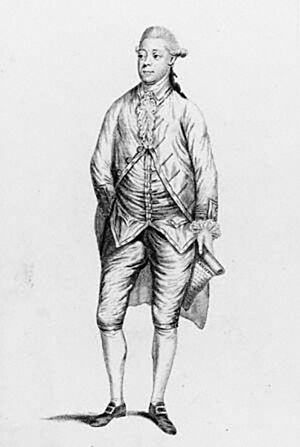George Ogle facts for kids
George Ogle (born October 14, 1742 – died August 10, 1814) was an important Irish Tory politician. He was known for his strong opinions and his love for writing songs. He played a big role in Irish politics during a time of many changes.
Contents
George Ogle's Life Story
Early Life and Talents
George Ogle was born on October 14, 1742. He was the only child of George Ogle, who was a translator. George grew up in a place called Rossminoge, near Camolin, in County Wexford. A local vicar named Miller helped raise him. This upbringing gave George very strong Protestant beliefs that stayed with him his whole life. He also went to Kilkenny College for his early education.
George loved literature and writing. While living in Rossminoge, he wrote two songs that became quite popular. One song was called "Banna's Banks." It started with the words "Shepherds, I have lost my love." People said he wrote it for a young woman named Miss Stepney. The second song, "Moll Ashore," was about Mary Moore. Her sister, Elizabeth Moore, later became George's wife. Even the famous poet Robert Burns admired "Banna's Banks," calling it "heavenly."
George was a wealthy and fashionable person. He enjoyed visiting social gatherings, like those hosted by Lady Miller. He even contributed to a book of poems published by her admirers in 1775. Some of his songs also appeared in other collections, like Popular Songs of Ireland. Despite his talent, George chose not to publish any of his poems himself.
A Voice in Politics
In 1768, George Ogle was elected to the Irish House of Commons. This was like being a member of parliament for County Wexford. He served in this role until 1796. George was a very good speaker. People said he used "splendid superlatives" and spoke with great energy.
He joined the Whig party. This group generally supported more rights for the people and for Ireland to make its own laws. However, George was against giving more rights to Catholics. He strongly supported the established Protestant church.
Around 1778, a misunderstanding led to a challenge. George was said to have made a remark about Catholics. He clarified that his words were misreported. He stated that he hated no one because of their faith. He believed in fairness for everyone.
In 1779, George criticized politicians in England. He felt they were not doing enough to help Ireland. He also joined a group called the Monks of St. Patrick.
Supporting Irish Rights
In 1782, George Ogle became a colonel in the Irish Volunteers. This was a group of armed citizens who wanted Ireland to have more control over its own laws. George strongly supported this movement. He believed Ireland should be able to govern itself.
However, during a big meeting in Dublin in 1783, a confusing event happened. George was said to have delivered a message from Lord Kenmare. This message suggested that Catholics were happy with their current rights and did not want more. Lord Kenmare quickly said he never sent such a message. It seems there was a misunderstanding or a trick involved.
In 1783, George Ogle became a member of the Irish privy council. This was a group of important advisors to the King. The next year, he got a job as the registrar of deeds in Dublin. This job paid him £1,300 a year. Even with this new job, his political actions did not change. He continued to push for fair reforms. For example, in 1786, he spoke out against landlords who were charging too much rent.
Later Political Career
In 1789, George Ogle disagreed with the English government's plans for a regency. A regency is when someone rules for the King if the King is unable to. In 1793, he spoke against a bill that would give more rights to Catholics. He worried that giving Catholics more political power might lead to Ireland separating from Britain or joining with Britain completely.
In 1796, George became the governor of Wexford. He then left the House of Commons and mostly lived on his estate called Bellevue. But in 1798, during a very troubled time, he agreed to return to parliament. This time, he represented Dublin City.
Even though he voted against the Act of Union in 1800, he was still elected to the new Parliament of the United Kingdom in 1801. He represented Dublin City once again. He finally retired from politics in 1804.
George Ogle passed away at Bellevue on August 10, 1814. A statue was made in his memory by John Smyth. It was placed in St. Patrick's Cathedral in Dublin. George Ogle did not have any children.
 | Frances Mary Albrier |
 | Whitney Young |
 | Muhammad Ali |


